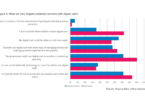Today U.S. Congress will hold a hearing on the Digital Dollar Dilemma to discuss the implications of a central bank digital currency (CBDC) and potential private sector alternatives. The Federal Reserve believes that a CBDC will help maintain the dollar’s unique role as the international reserve currency, and improve financial inclusion for millions of U.S. citizens. However, both the American Bankers Association (ABA) and the Bank Policy Institute strongly object to the Federal Reserve potentially launching a digital dollar.
The ABA noted that the dollar’s role in international payments is based on the strength of the U.S. rule of law, openness of the economy and the sophistication of it’s financial institutions. Hence, the ABA doesn’t believe a CBDC will help to maintain international dollar dominance. It also argued a CBDC would not further financial inclusion and is ultimately unnecessary in the U.S., where for most of the public the dollar is already digital.
A CBDC is a direct liability of the central bank, and would require moving significant funds from private banks to the Federal Reserve. According to the Federal Reserve, “[a] widely available CBDC could serve as a close substitute for commercial bank deposits”. However, the ABA argue this loss of deposits would impact banks’ ability to lend, putting a strain on credit markets and ultimately undermining the role of private banks. A CBDC would turn the Federal Reserve into an ‘advantaged competitor’, posing a serious threat, both to consumers and businesses.
Banks are keen for a wholesale CBDC
Instead the ABA suggested a CBDC should only be used for wholesale interbank settlement. One potential example was the recent Regulated Liability Network (RLN) trials involving the New York Federal Reserve’s innovation arm and numerous banks. It demonstrated blockchain bank deposit tokens, where the interbank settlement could use a CBDC.
Another banking body, the Bank Policy Institute (BPI), is giving testimony during today’s hearing. BPI’s Paige Paridon, will tell Congress that blockchain-based deposits enable “advanced programmability features, the ability to exchange funds with other digital assets atomically, and the transfer of commercial bank money on shared or universal ledgers where enhanced transparency of transactions and 24/7 transfer availability are possible.”
However, regulators currently do not distinguish between traditional bank activities using DLT or blockchain (such as tokenizing existing bank liabilities) and non-bank issued cryptocurrencies, which present very different levels of risk.
The Bank Policy Institute also highlights the issues of who bears the costs of implementating a CBDC. Maintaining good customer service for CBDC holders, whilst complying with AML/ CFT rules would incur considerable costs to financial intermediaries. This might result in charging consumers for holding and transferring CBDC.
Meanwhile, the positions of the U.S. banking bodies contrast with the multiple European banking associations that have shared views on a digital euro. For example, the European Banking Federation and associations in Germany and Italy, adopted neutral or supportive stances on a CBDC. Unlike the U.S., European bankers view a digital euro as almost inevitable.






